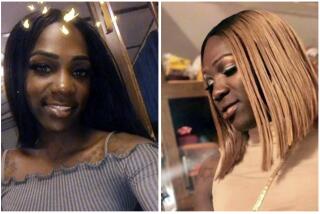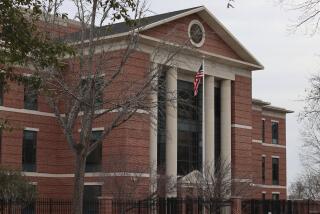Jury in church massacre trial watches Dylann Roof’s confession: ‘We all know I’m guilty’
Reporting from atlanta — In a lengthy taped interview with FBI agents conducted a day after he fatally shot nine black members of a Charleston Bible study, Dylann Roof casually and matter-of-factly confessed to the crimes, giggling uneasily as he recounted his actions and his motivation.
The massacre was “minuscule,” he said, compared with what African Americans were doing to white people every day.
At times, Roof appeared confused, expressing shock he had killed as many as nine people, admitting he was “freaking out” during the shooting and preferred not to think about his victims.
Asked if he had any regrets, the gangly high school drop-out sighed heavily: “Yeah, I’d say so,” he said blankly, in a deep yet faltering voice. “I regret doing it, a little bit.”
Jurors heard the chilling two-hour confession on Friday, the third day of Roof’s federal hate-crimes trial. The 22-year-old white supremacist from Columbia, S.C., is accused of murdering nine people at Emanuel African Methodist Episcopal Church in downtown Charleston. The court made a tape of the FBI interview available online.
“I went to that church in Charleston and, uh, you know, I did it,” Roof told FBI agents after waiving his right to an attorney.
When pressed to describe his actions, Roof was reluctant at first — not because he was afraid he would seem guilty, he explained, but because he didn’t really like saying it. An FBI agent asked him again.
Well, I killed them, I guess.
— Dylann Roof
“Well, I killed them, I guess,” Roof said hesitantly. “I don’t really know how many people or anything like that.”
Prosecutors played the entire confession, recorded after Roof, who was 21 at the time, was arrested in North Carolina the day after the June 17, 2015, shooting. Roof told investigators he chose Emanuel AME Church because of its history as the oldest black church in the South and because he was confident only black people would attend the Bible study.
The day after the shooting, he appeared surprised that the crime had left nine people dead. “There wasn’t even nine people there,” he said flatly. “Are you guys lying to me?”
The agents assured him they were not.
“Oh, well,” he murmured as he fidgeted with a plastic bottle top and rubbed his fingers on the oval, wooden conference table.
The agent asked how he felt.
“Well, it makes me feel bad,” he muttered softly.
The jury has already heard testimony from one of the two adult survivors of the shooting. It has also listened to first responders and seen graphic crime scene photos and videos of bodies strewn on the church’s white linoleum floor, surrounded by discarded Bibles, ammunition and shell casings.
“I am guilty,” Roof said, chuckling uncomfortably as the agent asked if he thought he had committed a crime. “We all know I’m guilty.”
“What do you think should happen to you?” one of the agents asked.
“Ugh, I don’t know how to answer that,” he sighed.
In a 33-count indictment, the Department of Justice charged Roof with 12 counts of committing a hate crime against black victims, 12 counts of obstructing the exercise of religion and nine counts of using a firearm to commit murder. The agency is seeking the death penalty due to what it called his “lack of remorse” and “animosity towards African Americans.”
Roof told agents he did not have any accomplices, and drew inspiration from from information he gleaned online. “It sounds lame, you know, you don’t really Iike to say it, but it was pretty much just the Internet,” he said. “All the information’s there for you.”
After drinking “half a Smirnoff,” Roof told investigators, he walked into the church, carrying a .45-caliber Glock pistol and a heavy bag crammed with seven magazines of ammunition. He was silent as parishioners sat around a table discussing the Book of Mark’s Parable of the Sower.
“I was sitting there just thinking about whether I should do it or not … because I know I could have just walked out,” he said. “But then — I’m not going to say in the spur of the moment, but you know — I just finally decided I had to do it.”
After the shooting, he said, he was “in absolute awe” when he peeked out the church door and found no police outside. He had saved one of the eight magazines he’d bought at Walmart, expecting to kill himself if confronted by police officers.
Describing himself as a white nationalist and admirer of Adolf Hitler, Roof was clear and unapologetic about his desire for racial retribution.
“Somebody had to do something because, you know, black people are killing white people every day on the streets, and they rape white women,” he said.
The Trayvon Martin case, in which the killing of a black Florida teenager in 2012 prompted nationwide protests, “woke” him up, he said.
When asked what he meant, he said: “Viewing everything that happened ever through a racial lens… that’s what black people do. From the day black people are born, they’re viewing everything that happens to them through a racial lens. That’s why they get offended so easily.”
Roof is the first defendant in American history to face parallel death penalty trials from state and federal governments. In January, he faces a second potential death sentence on charges of murder and attempted murder in a state trial.
Until now, the main window into Roof’s motivation was a 2,000-word racist manifesto he posted online the day of the shooting.
During the trial, Roof has remained stiff and impassive, staring down at the wooden defense table.
Not long after prosecutors finished opening statements Wednesday, Roof’s mother collapsed. Later, his defense attorneys said she’d had a heart attack.
Handwritten notes to his mother and father were found in the backseat of Roof’s black Hyundai sedan after his arrest. “I love you,” he wrote to his mother. “I know that what I did will have repercussions on my whole family and for this, I truly am sorry. At this moment, I miss you very much and as childish as it sounds, I wish I was in your arms.”
The first witness, Felicia Sanders, a church usher who was one of two adult survivors and lost her 26-year-old son in the massacre, delivered testimony on Wednesday that was so emotional the defense attorneys wiped away tears.
“He’s evil,” Sanders said under cross-examination. “There’s no place on earth for him except the pit of hell.”
Her statement prompted the defense team on Thursday to call for a mistrial, arguing the law did not allow survivors and family members of victims to offer opinions about appropriate penalties during the guilt phase of the trial.
Roof’s defense team is representing him only in the guilt phase. In an unusual move, Roof has said he will take over his defense and act as his own attorney during the sentencing stage.
Jarvie is a special correspondent.
ALSO
Clinton won as many votes as Obama in 2012 — just not in the states where she needed them most
More than 20,000 sign petition to recall socialist Seattle councilwoman who urged Trump protests
In New York, attacks on women with headscarves raise alarms
More to Read
Sign up for Essential California
The most important California stories and recommendations in your inbox every morning.
You may occasionally receive promotional content from the Los Angeles Times.











